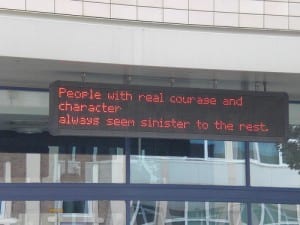ELESIG, or the evaluation of E-learners Experience of Learning Special Interest Group has a Midlands Group, which met at Loughborough University on Friday 17th September, which I attended. The main topic was a discussion of “Lecture Capture” software, which is now being used quite extensively at Loughborough. However, before we got onto that there was a general discussion of the future of the group, and some of the issues that we are concerned with. Firstly, and anyone from Lincoln who is reading this should take note, ELESIG needs more committee members and more people to attend its meetings. They also offer mall grants – up to £500 for literature reviews and case studies for example, and it is well worth putting in a bid for these. The Loughborough meeting was of the regional group, but there is a national group meeting in London on 6th October. If you’re interested you can find out more about the group at
http://elesig.ning.com/
As is often the case there was quite a wide ranging discussion of issues that members were interested in. First we got on to formal methods of evaluation that were being used. This provoked quite a lot of debate including considerable scepticism about what are sometimes called happy sheets, since these usually end up in a drawer, on their short but inevitable journey to the paper recycling bin. Members described interesting projects using video, Twitter, and mobile phones, the informality implicit in small devices in general being thought to be better at engaging students in completing them, and in some ways delivering more impact to staff. Video was thought to very useful for delivering evaluation reports to senior managers
The second issue was around the accessibility and the question of how to change VLEs. What do dyslexic students think about their experience of their learning on Blackboard. http://www.lexdis.org.uk was highlighted as a useful resource. Some colleagues exporte a blackboard course onto a disc, so that partially sighted, or people with low/no speed connection can access it. (needs some software, but a good idea)
There was a brief discussion of a product called Xerte and it’s ability, or not, to produce accessible materials. Loughborough reported problems with running it, that had, eventually led them to abandon it. Camtasia was also discussed, but users had found that there was a need to produce multiple versions to maintain accessibility.
Discussions on LinkedIn about various alternatives to Xerte (e.g. My Udutu) were mentioned, but I haven’t had time to follow these up yet, which was also true of Kineo.com, which apparently contains lots of reviews of tools for creating learning materials, and apparently something called Clive Shepherd’s 60 minute Masters is worth looking at
A slightly left of field idea was that of having standards for Blackboard sites. One institution has bronze, (absolute minimum) silver and gold standards for BB sites (However, they haven’t yet succeeded in getting any sites above Bronze!)
Lecture Capture at Loughborough
Origninally, there was quite a lot of resistance but now it’s fairly mainstream in that most people experimenting with it. They have 10 fixed and 5 mobile installations, the latter being entirely software based. They’re using a product called ECHO 360. It’s expensive at £3,000 p.a. for a single installation (Plus £1750 one off cost for the fixed boxes), but their may be a way to reduce that, which I’ll get to later. There are alternatives. Some open source products were mentioned one called Matterhorn was singled out as being particularly worth a look. Essentially the system shows a thumbnail gallery of the slides with the time each is displayed. Captures are normally ready 5-6 minutes after lecture completed. Lectures are editable – so you can choose where slides are displayed within the lecture, and of course you can paste the URL into the VLE, so it’s easily accessible. Students can click on the slide and go directly to that section of the lecture. An incidental benefit was (apparently) that the system has dramatically improved academic sartorial standards at Loughborough!
It’s not without disadvantages, of course. Installations have to have duct tape on floor to indicate to the lecturer where to stand, although, apparently the space is quite generous. There is still a rather murky understanding of IP and particularly, performer’s rights, which hasn’t been fully resolved. Newcastle apparently has a policy of no reuse except to cohorts other than that to which it was originally delivered. Most of the members thought that was unduly cautious, but it did provoke a question about how long a captured lecture might last.
Initally it was hard to engage staff with it, for fear of students not attending, the argument that it perpetuates an outdated delivery mode and of course, the suspicion that it’s a way of replacing lecturers. Further, you do need to be very careful what you say! One way of dealing with the non-attendance issue was to rebrand it as ReView (emphasis on the first syllable) to stress that it’s not an alternative to attending, rather it’s a revision tool. Loughborough’s evaluations suggest that this has proved very popular with students.
Finally, and related to the rights issue, is the question of what to do with lectures once they’ve been captured. A few universities are signing up with iTunesU. It was suggested that Apple may be persuaded to contribute to the cost of lecture capture systems if people prepared to post content thereon, although, of course that will not cover the cost of the ongoing licenses.
All in all a very useful and interesting meeting, and I’d certainly recommend ELESIG to colleagues.

You must be logged in to post a comment.